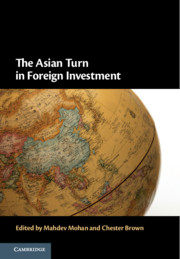Book contents
- The Asian Turn in Foreign Investment
- The Asian Turn in Foreign Investment
- Copyright page
- Contents
- Figures
- Tables
- Contributors
- Acknowledgements
- Table of Cases
- Table of Treaties
- Abbreviations
- Part I Introduction
- Part II National Approaches within Asia to the Regulation and Protection of Foreign Investment
- Part III The Rebalancing of Regulatory Space and Investor Protection in Asia
- Part IV Multilateral Rule-Making in Asia on Trade and Investment: From ASEAN to the Comprehensive and Progressive Agreement for Trans-Pacific Partnership
- Part V Emerging Issues
- 15 The Due Diligence Expansion in International Investment Arbitration
- 16 Combating Haze Pollution through the Enforcement of Investment Treaties and Human Rights
- 17 Transparency in Investor–State Arbitration
- 18 Third-Party Funding in Asia
- 19 Settling Investment Disputes through Mediation
- 20 The Singapore Convention on Mediation
- Part VI What Lies Ahead?
- Index
19 - Settling Investment Disputes through Mediation
Possibilities and Limitations
from Part V - Emerging Issues
Published online by Cambridge University Press: 13 August 2021
- The Asian Turn in Foreign Investment
- The Asian Turn in Foreign Investment
- Copyright page
- Contents
- Figures
- Tables
- Contributors
- Acknowledgements
- Table of Cases
- Table of Treaties
- Abbreviations
- Part I Introduction
- Part II National Approaches within Asia to the Regulation and Protection of Foreign Investment
- Part III The Rebalancing of Regulatory Space and Investor Protection in Asia
- Part IV Multilateral Rule-Making in Asia on Trade and Investment: From ASEAN to the Comprehensive and Progressive Agreement for Trans-Pacific Partnership
- Part V Emerging Issues
- 15 The Due Diligence Expansion in International Investment Arbitration
- 16 Combating Haze Pollution through the Enforcement of Investment Treaties and Human Rights
- 17 Transparency in Investor–State Arbitration
- 18 Third-Party Funding in Asia
- 19 Settling Investment Disputes through Mediation
- 20 The Singapore Convention on Mediation
- Part VI What Lies Ahead?
- Index
Summary
The international community realizes the possible benefits and contributions of mediation as a means of settling international investment disputes, most notably, its unique trait to deal with sensitive claims relating to national regulatory authority.Discussions to introduce and facilitate mediation in addition to or in lieu of present ISDS proceedings are taking place in various fora at the moment including UNCITRAL and ICSID.These discussions are not intended to replace the ISDS regime with a non-binding mechanism. Rather, the purpose is to supplement the existing system with the addition of a new avenue, where the disputing parties can pursue an amicable resolution. The focal point in the current discussions is how to introduce mediation into international investment agreements in a more structured and systematized manner.Various experiments are being undertaken at the moment.Traditionally, Asian countries have been regarded as being more receptive of the harmonious resolution of disputes and less litigious in settling disputes. This traditional legal culture stands in line with the recent focus on mediation as a means of settling international disputes and, in particular, international investment disputes. Mediation is one of the ISDS reform subjects where Asian countries can contribute their experience and legal culture.
Keywords
- Type
- Chapter
- Information
- The Asian Turn in Foreign Investment , pp. 327 - 339Publisher: Cambridge University PressPrint publication year: 2021



